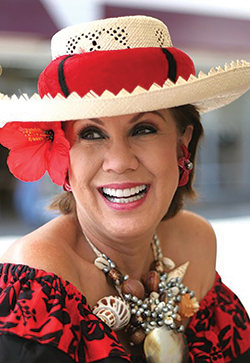Advanced Breast Cancer Survivor
Garden Blooms Hope and Healing
 After beating cervical cancer, Iwalani Walsh Tseu was diligent about getting her well-woman screenings, including mammograms. However, during a stressful divorce many years later, she put the screenings off for two years. When she got back on schedule, the results of a mammogram indicated the need for further testing, after which she was diagnosed with Stage III breast cancer. Determined to cure her cancer and help others, Iwalani focused her energy on a project that gave her strength and helped her heal. Today, she is cancer-free, and her Healing Garden is a beautiful source of peace and hope for other survivors in Hawaii.
After beating cervical cancer, Iwalani Walsh Tseu was diligent about getting her well-woman screenings, including mammograms. However, during a stressful divorce many years later, she put the screenings off for two years. When she got back on schedule, the results of a mammogram indicated the need for further testing, after which she was diagnosed with Stage III breast cancer. Determined to cure her cancer and help others, Iwalani focused her energy on a project that gave her strength and helped her heal. Today, she is cancer-free, and her Healing Garden is a beautiful source of peace and hope for other survivors in Hawaii.
When I was diagnosed with Stage III breast cancer at 48, everyone was shocked, including me, because I was in top physical shape. I owned and danced at a Hawaiian/Polynesian dance studio in Hawaii. However, the two years that surrounded my divorce were very stressful, and in those two years, I developed breast cancer and it grew. I believe that a big part of cancer is about stress and changing the way you think, so I adopted a positive attitude right from the beginning. My three daughters were in college, and I had to be strong for them. In order to conquer this, I knew I would have to be a tower of strength and not pity myself.
My treatment strategy was straightforward. I had a lumpectomy to remove the tumor, followed by eight weeks of radiation therapy. Luckily, I had no side effects. I believe that is because, aside from the cancer, I was both physically and emotionally healthy. I had good eating habits that started after I was diagnosed with cervical cancer years before. I’d also done a lot of research on nutrition, genetics and the environment. After that, I stopped eating red meat and ate lots of fruits and vegetables. I continued to dance and get a lot of exercise during treatment. I also surrounded myself with positive people. I never wanted to give myself a chance to be brought down.
I had a lot of support from the people around me. My dance students and friends brought flowers and food while I was recovering from surgery. I appreciated their kindness, and I liked to hear the chatter of many people and music playing in the house while I was recovering. I also made it a point to laugh out loud — a lot. I love to laugh, and I think it is so important.
I was very vocal about my situation because I just felt I had to get it out. I even organized a support group. Together, we relied on faith, family and friends to heal.
While I was recovering, I took on an enormous project that helped me keep my mind off the cancer. When my father passed away years before, I inherited two acres of land. The land, which can be seen from the hospital, had been sitting vacant. People had used it for a dumping ground, and it had basically turned into a junkyard. But I saw the potential in it. I wanted to turn it into a healing garden.
I knew it would be a massive project, and I felt prepared to take it on even though my daughters weren’t on board with it. I had many medical bills from the treatment, and they wanted me to sell the land to help pay the bills. I wanted to be able to leave the land to them one day, and I had a vision of what a healing garden could mean for me and many others. The work was hard, but it was a source of healing for me. Friends and family members helped me take more than 500 loads of junk to the dump. I am a very social person, and I became a bit of a recluse because I spent so much time in the garden. In total, the project took eight years.
The Healing Garden is a beautiful area. I designed it to be a peaceful place for people who have cancer and their families to relax, enjoy being together and create new memories. It houses more than 300 types of plants, trees and flowers. It’s become a wonderful part of our community. We host programs about cancer awareness, and families have different types of events at the garden.
Today, I'm cancer-free. I tend to the garden weekly to make sure it is comfortable and inviting. Eventually, I also started the Iwalani Foundation, a 501(c)(3) organization, to help create awareness in Hawaii and raise funds for breast cancer prevention.
If you’ve been diagnosed with breast cancer, I encourage you to think positively. Do the things you like doing. Write about how you’re feeling in a journal. It’s a good place to open up and acknowledge your fears. Don’t give up what you enjoy, whether it’s sewing, cooking or dancing. You don’t have to know how to do a certain dance, just dance any way you can. And if your loved ones have cancer, talk to them. Dance with them. Laugh with them. Love them.


